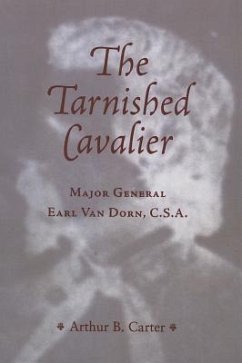"Arthur Carter brings new perspective to Confederate knight-errant Earl Van Dorn, who might have been famous rather than infamous had he lived. . . . Carter suggests how Van Dorn the cavalryman could have joined mounted leaders Forrest, Morgan, and Wheeler as raiders-superb and mainstay of Confederate success in the West. Except for one costly peccadillo, Van Dorn would have been one of the South's rising rather than falling stars."--Benjamin Franklin Cooling, Author of Fort Donelson's Legacy Dashing, bold, and fearless in command, Major General Earl Van Dorn was a soldier whose star shone brightly during the early days of the Confederacy. A veteran of the Mexican War and Indian campaigns, he is remembered for suffering devastating defeats while leading armies at Pea Ridge and Corinth and then redeeming himself as a cavalry commander at Holly Springs and Thompson Station. Yet he was perhaps best known for his reputation as a womanizer killed by an irate husband at the height of his career. Arthur B. Carter's biography of Van Dorn, the first in three decades, draws on previously unpublished sources regarding the general's affair with Martha Goodbread--which resulted in three children--and his liaison with Jessica Peters, which resulted in his death. This new material, unknown to previous biographers, includes the revelation that the true circumstances of Van Dorn's death were kept secret by friends and comrades in order to protect his family. Carter reveals that the general was probably mortally wounded on the Peters plantation but was carried back to his Spring Hill headquarters. He reconstructs the details of Van Dorn's murder in a brisk narrative that draws on accounts of Van Dorn's confidantes, capturing both the danger and passion of those events. The Tarnished Cavalier is more than a story of scandal. Carter sheds new light on Confederate conduct of the war in the western theater during 1861 and 1862, revisits the pivotal battles of Pea Ridge and Corinth--both of which are important to understanding the loss of the upper South--and introduces new perspectives on the defense of Vicksburg and the Middle Tennessee operations of early 1863. Carter's narrative juxtaposes Van Dorn's flamboyance with his failings as a commander: although he was a soldier with heroic aspirations, he was also impulsive, reckless, and unable to delegate authority. Perhaps more telling, it shows how Van Dorn's character flaws extended to his personal life, cutting short a promising career. The Author: Arthur B. Carter, a retired U.S. Army officer and educator, lives in Mobile, Alabama.
Hinweis: Dieser Artikel kann nur an eine deutsche Lieferadresse ausgeliefert werden.
Hinweis: Dieser Artikel kann nur an eine deutsche Lieferadresse ausgeliefert werden.








